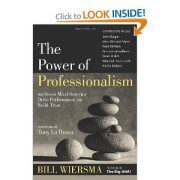Mind-Set Matters
The Power of Professionalism
The Seven Mind-Sets That Drive Performance and Build Trust
Lawyers and those who work with lawyers have taken to debating whether law is still a profession or whether it’s “just” a business. The substance of the debate matters deeply: without attention to the business aspects of a legal practice, the practice will flounder and, ultimately, fail. At the same time, the distinction is almost irrelevant, since many professionals attend to business as a part of their professional approach and we have many issues more deserving of attention than mere semantics.
While The Power of Professionalism seeks to define “prfessional much more broadly than the traditional meaning of one who works in the professions, the mindsets to which the subtitle alludes has special relevance for laywers. Lawyers’ professionalism may be judged by clients largely based on public perception of lawyers’ trustworthiness. According to a 2010 study, only 17% of respondents rated lawyers’ honesty and ethical standards as above average, and 35% rated those characteristics as below average. There’s work to be done.
Professionals know what they’re doing, both technically and in other tangible ways. However, as important as technical competence is, professionals are not typically defined by their competence. Technical competency is the minimum requirement when considering whether or not someone is a professional.
Too many lawyers expect that excellent legal skill is enough for a successful practice. However, as The Power of Professionalism argues, skill also will not define a professional. Skill is required, but knowing how to use that skill (knowledge that can be implemented, in other words, as opposed to pure intellectual knowledge) and using it in a way that produced trust, is the mark of a professional.
Bill Wiersma, the author of The Power of Professionalism, has identified several mind-sets of trusted professionals, which might be viewed as foundational principles for professionalism.
- Professionals have a bias for results. What’s more, those results are sustainable, consistently reproducible, and grounded in ethical behavior.
- Professionals realize (and act like) they’re part of something bigger than themselves. A trusted advisor (long the gold standard aspiration for lawyers) is one who puts clients ahead of his or own interest, without exception. In the view of The Power of Professionalism, this aspect expands to include placing the team’s or the firm’s interest ahead of the individual’s.
- Professionals know things get better when they get better. While focusing on the overarching goals of someone (a client) or something (a firm) else, the professional will experience growth. As I read this section, I flashed to lawyers who attend CLE programs to better serve their clients as opposed to those who attend merely to earn the required credits.
- Professionals have personal standards that often transcend organizational ones. Personal standards often derive from one’s “true north”, the core values that matter most.
- Professionals know that personal integrity is all they have. This mind-set is somewhat similar to #4, with the focus being on integrity based on authenticity, honesty, fulfilling commitments, and refusing to violate others’ trust.
- Professionals aspire to be masters of their emotions, not enslaved by them. This mindset is subdivided into three additional principles.
a. Professionals are respecting when it’s difficult to be respectful.
b. Professionals maintain their objectivity and keep their wits about them.
c. Professionals manage their ego and resist the urge for immediate gratification. - Professionals aspire to reveal value in others. According to this principle, professionals seek to help others grow and succeed.
Whey does this matter for lawyers? In many cases, the standards of professionalism espoused by Wiersma are almost identical to the standards for solid leadership. However, Wiersma expands these principles and demonstrates their applicability to day-to-day circumstances for a variety of workers, thus eliminating the objection that only those who have particular titles or responsibilities qualify as leaders.
Adopting the professionals’ mind-sets that Wiersma offers will also produce business development benefits. Revisit each of the mind-sets and envision a referral source attributing them to you. Operating from these mindsets will help to grow relationships and will support a strong reputation.
You may not find anything new or earthshaking about The Power of Professionalism, but it’s an excellent reminder for lawyers at any stage of practice.




Leave a Reply
Want to join the discussion?Feel free to contribute!